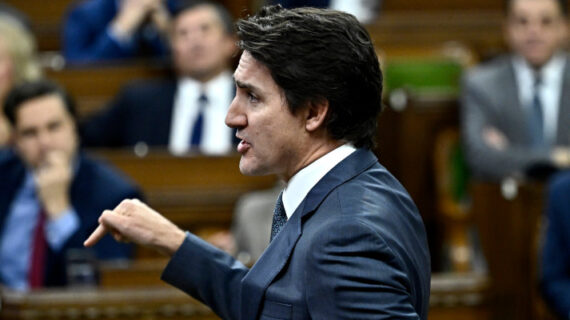- Industry experts estimate that more than $10 billion in combined spending was announced earlier this month to ensure Ontario and Nova Scotia would play a major role in North America’s electric vehicle industry.
- A recent analysis by the Fraser Institute found that, when adjusted for inflation, business subsidies in Canada add up to $352 billion since 2007, when taking federal, provincial, and local dollars into account.
- The spending has been labelled as an example of “reshoring," which is the process of bringing jobs and industry back home in the wake of supply chains being severely disrupted by the COVID-19 pandemic and the war in Ukraine.
Canada’s federal and provincial governments are spending billions to host new and emerging world industries, even if it flies in the face of mainstream economic thinking.
Industry experts estimate that more than $10 billion in combined spending was announced earlier this month to ensure Ontario and Nova Scotia would play a major role in North America’s electric vehicle industry.
Nova Scotia will see its existing Michelin plant expand to start the production of EV tires, while St. Thomas, Ontario will be the site of a new Volkswagen EV battery plant.
President Joe Biden has pledged billions in funding and incentives for green industry expansion, while China has been strategically subsidizing domestic industries for years.
“Whenever you have governments interfere with the market, unless it’s a market failure, most economists would say it’s not the right thing to do,” says Walid Hejazi, an associate professor of economic analysis and policy at the University of Toronto’s Rotman School of Management. “But I think in this new environment, there’s increasing pressure, especially with strategic industries.”
Canada’s share of the global economy amounts to under 2 percent according to the International Monetary Fund, and Hejazi says that share is shrinking and will get worse unless Canada changes its direction.
“Is Canada relevant? Not really, and if you look at current trends, it’s getting worse for us in terms of relevancy,” says Hejazi.
A recent analysis by the Fraser Institute found that, when adjusted for inflation, business subsidies in Canada add up to $352 billion since 2007, when taking federal, provincial, and local dollars into account. Provincial money makes up the highest portion of that total at $223 billion.
Tegan Hill and Joel Emes, both senior economists at the Fraser Institute, argue that a better use of this money would be simply to lower taxes on businesses rather than handing them money.
“Prince Edward Island could have eliminated all corporate income taxes (since 2007) if it had ended subsidies to businesses, and still have money left over,” they write.
Politicians of all stripes across Canada don’t see it that way.
Bridgewater, N.S., was in competition with other locations, such as cities in Mexico, for the Michelin factory expansion, and Susan Corkum-Greek, Nova Scotia’s minister for economic development, says the process was not easy.
“This was no cakewalk. Michelin is a global player, it’s a reality that they could have chosen to go and grow anywhere in the world,” says Corkum-Greek. “That’s why it was so important to work with our partners and other levels of government to ensure that we were competitive with that global sphere.”
Corkum-Greek points out that Michelin has operated in Nova Scotia for 52 years, and says it was the French tire manufacturer’s first North American plant location.
“Michelin is a very significant employer in our province, whose jobs are located in those rural communities,” says Corkum-Greek. When we consider that tires are our second largest export…that’s rural Nova Scotia, delivering big time in terms of value to the economy.”
For Nova Scotia to be both competitive and successful in their bid for the Michelin expansion, the federal government offered $44.3 million from the Strategic Innovation Fund. The SIF was launched in 2017 by the federal government with the intent of supporting innovative businesses and industries.
Michelin also received an additional $61.3 million in tax credits over five years from the provincial government. Beyond incentives, the provincial and federal funding is expected to be partially used to reduce carbon emissions via electrification.
Expanding Michelin’s operations in Bridgewater was cheap compared to the costs of landing Volkswagen’s EV battery plant in St. Thomas, Ontario. The federal government has not revealed the final costs, but estimates of the cost range as high as $10 billion in spending and incentives for the plant.

The spending was labelled as an example of “reshoring,” which is the process of bringing jobs and industry back home in the wake of supply chains being severely disrupted by the COVID-19 pandemic and the war in Ukraine. However, not all agree with this assessment.
Andreas Schotter, a professor of international business at Western University’s Ivey School of Business, says the federal government’s spending to land the battery plant in St. Thomas was not an example of reshoring.
“What we witness today is the restructuring of globalization forces to a global-regions model,” says Schotter. “Instead of worldwide value chains that basically operate and are interconnected around the globe, this new trend is a concentration of entire value chains in a number of global regions.”
Schotter says these trends are driven by a variety of factors, including rising nationalism, shifts in market attractiveness and the importance of natural resources, increased transportation costs and talent shortages.
“The battery plant fits the green technology agenda of the current federal government, though battery production value chains are not necessarily green,” says Schotter. “It is also a way to save Ontario auto-worker jobs.”
Hejazi says there were no guarantees from Michelin or Volkswagen that they would expand their EV operations in Canada, and credits the federal government for moving aggressively to land those projects.
“When you make these investments, they have a long-term horizon,” says Hejazi. “Acting now is so important because if these facilities were produced somewhere else, they’re not easily moved back.”




